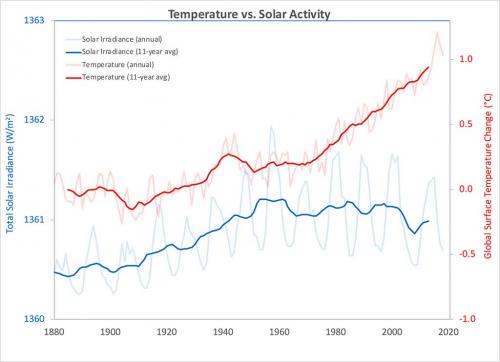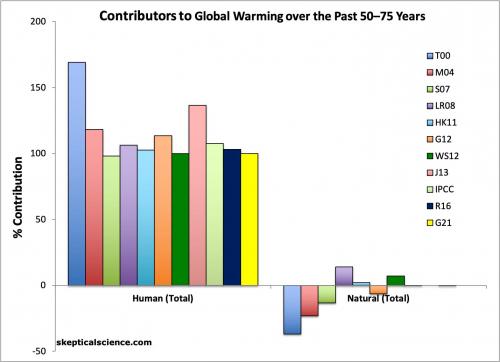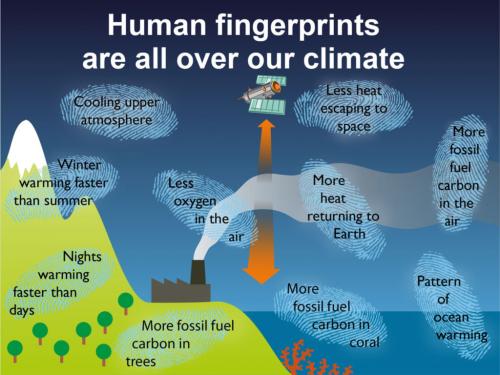The IPCC confidence in human-caused global warming is based on solid scientific research
What the science says...
The IPCC confidence in human-caused global warming is based on summarizing the body of peer-reviewed scientific research.
Climate Myth...
IPCC human-caused global warming attribution confidence is unfounded
"[The IPCC 95% confidence in human-caused global warming] is incomprehensible to me ... IPCC projections are overconfident" (Judith Curry)
The fifth Intergovernmental Panel on Climate Change (IPCC) report states with 95 percent confidence that humans are the main cause of the current global warming. Many media outlets have reported that this is an increase from the 90 percent certainty in the fourth IPCC report, but actually the change is much more significant than that. In fact, if you look closely, the IPCC says that humans have most likely caused all of the global warming over the past 60 years.
What's causing global warming: human greenhouse gas emissions.
"The best estimate of the human-induced contribution to warming is similar to the observed warming over this period ... The observed warming since 1951 can be attributed to the different natural and anthropogenic drivers and their contributions can now be quantified. Greenhouse gases contributed a global mean surface warming likely to be in the range of 0.5°C to 1.3 °C over the period 1951−2010, with the contributions from other anthropogenic forcings, including the cooling effect of aerosols, likely to be in the range of −0.6°C to 0.1°C."
What's not causing global warming: natural external factors like solar activity, and natural internal factors like ocean cycles.
"The contribution from natural forcings is likely to be in the range of −0.1°C to 0.1°C, and from internal variability is likely to be in the range of −0.1°C to 0.1°C."
We've observed about 0.6°C average global surface warming over the past 60 years. During that time, the IPCC best estimate is that greenhouse gases have caused about 0.9°C warming, which was partially offset by about 0.3°C cooling from human aerosol emissions. During that time, natural external factors had no net influence on global temperatures. For example, solar activity has been flat since 1950. 
As for the natural internal variability of the Earth's climate system, short-term noise averages out to zero over long time frames. Warm and cool ocean cycles cancel each other out, and thus internal variability has no long-term influence on average global temperatures.
Put it all together, and the IPCC is 95 percent confident that humans have caused most of the observed global surface warming over the past 60 years. Their best estimate is that humans have caused 100 percent of that global warming.
IPCC is Summarizing the Scientific Research
The IPCC does not conduct any original research; it's a summary report, and these statements accurately reflect the body of climate science research. For example, last year climate scientists Tom Wigley and Ben Santer published a paper concluding that human climate influences were responsible for 50 to 150 percent of the observed warming from 1950 to 2005.
Like this new IPCC statement, they found 95 percent probability that humans have caused at least half the observed warming since 1950, and most likely all of it. It's also possible that humans have caused more warming than has been observed because natural factors may have had a net cooling effect. The Wigley and Santer results are consistent with the body of scientific research on the causes of global warming.

The 'fingerprints' of climate change are also all consistent with what we expect to see as a result of human-caused global warming, for example changes in the atmosphere, as another paper by Ben Santer recently concluded.

What About the Naysayers?
A few naysayers like Judith Curry from Georgia Tech have disputed the IPCC confidence on this question, for example in an interview with the reliably inaccurate David Rose.
However, while Curry is a climate scientist, she doesn't research the causes of global warming. She also has a history of exaggerating climate uncertainties. Her comments are inconsistent with the body of scientific research on the subject. Put simply, she is speaking outside her area of expertise, like a podiatrist giving advice on open heart surgery.
The 97 Percent Consensus is Evidence-Based
This is why there's a 97 percent consensus amongst climate experts and in the climate science literature that humans are causing global warming. The scientific evidence on this question is overwhelming.
Many commenters have noted that the expert consensus is itself not scientific evidence for human-caused global warming. That's true. The expert consensus is however based on the scientific evidence. The fact that 97 percent of climate experts agree on this subject also demonstrates the strength of the scientific evidence on human-caused global warming. And the strength of the evidence is why the IPCC is able to say with 95 percent confidence that humans are the main cause of the current global warming.
Intermediate rebuttal written by dana1981
Update July 2015:
Here is a related lecture-video from Denial101x - Making Sense of Climate Science Denial
This rebuttal was updated by Kyle Pressler in September 2021 to replace broken links. The updates are a result of our call for help published in May 2021.
Last updated on 11 July 2015 by MichaelK. View Archives































 Arguments
Arguments





























Dogmatico @1 ,
never have I encountered a bias or a website claiming to be "sceinctific" [sic]
. . . perhaps you would be kind enough to explain (in English) ?
So far, the readers here can have little (or low) confindence [sic] that you have any idea what you are on about.
dogmatico @1,
It can be stated that all that exists is the opinions that each person develops and the actions that they take.
The future is the accumulated result of everyone's developed Opinions and Resulting Actions, including updating Opinions based on expanded awareness and improved understanding applied to help develop sustainable improvements for humanity.
I await a thoughtful explanation of what is wrong with the content of this post on this website that this comment is made on "to help develop sustainable improvements for humanity".
Judith Curry is correct. Science is not group think. The percentage of practitioners who agree with a theory is not the confidence interval that it is correct. Consider the so called scientific communities acceptance of Copernicus and Galileo.
@3
Yes this is true, however.... you will make a big Non Sequitur logic fallacy if you think that is what happened with climate science.
In fact the confidence came first and then when the confidence interval was high enough for years and years and every counter explanation of the evidence falsified, that finally consensus emerged.
If Galileo's contemporaries had developed their own instruments similar to his, repeated his observations, replicated his results, reached his conclusions through multiple independents lines of inquiries, there would have been a scientific consensus in no time. Of course, in the time of Galileo, science was more like philosophy and had severe social constraints emanating from the religious power structures, who would not let one challenge their authority so easily. So the consensus that existed at the time was by no means a scientific consensus, but a mish mash of superstition, dogmatism, conformism, social control, politics etc.
The difference is glaringly obvious, and anyone with basic critical thinking skills can see through the fallacy.
A scientific consensus does not consist of a bunch of people getting together to pat each other on the back for agreeing with all the rest of them. It consists of multiple independent teams working hard, double checking their results, submitting them to highly critical peers who will try their hardest to find flaws in their work, and independently reaching the same conclusions. A scientific consensus is not similar opinions across the board, it is persistent convergence of research results. That is what an examination of the scientific litterature will show.
Deplore This @3,
As set out by Philippe Chantreau @5, in the time of Galileo there wasn't much of a process which could be today called a "scientific community's acceptance" to allow us to understand how far Galileo's contemparies accepted his work. All we hear is that the Pope famously got very 'trumpy' with his work. But if you roll the clock on 50 years and you find the likes of 'Entretiens sur la pluralité des mondes' or 'Philosophiæ Naturalis Principia Mathematica' so in 50 years there was established complete acceptance.
And so for comprison, 50 years on from, say, the likes of John Sawyer setting out the scientific case for saying:-
50 years on we see there is a very strong consensus that such a finding is correct. And spelling-wise, "Judith Curry" is correct although so much of what she writes about climate change is unsubstatiated nonsense.
Very well expressed, Philippe and MA Rodger.
What is the probability that the poster @3 will return to admit his mistake in logical thinking? Or will he fall back and use Curry's technique of vague rhetorical blather ~ so sadly deficient in critical analysis.
“We don’t look for absolute proof, as that can never really exist in science, we look for what the preponderance of evidence tells us. There is no absolute proof for Gravity, Evolution, Quantum Mechanics, Particle Physics, insert your discipline of choice. There is only what the weight of evidence tells us. Climatology is no different.”
scienceblogs.com/illconsidered/2006/05/there-is-no-evidence/